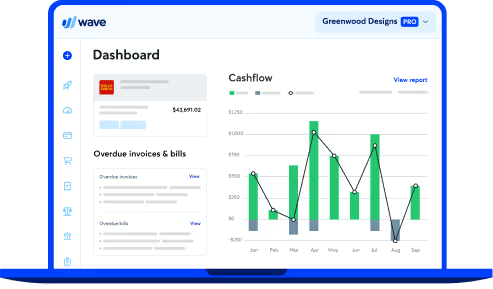
Five practical tips for paying off your business debt
In a recent Wave survey, 60% of respondents expressed fear or uncertainty about their business’ future. Many business owners have unwillingly taken on debt to stay afloat during COVID-19, and aren’t comfortable having it hang around. If being in the red makes you nervous about the future, these five practical tips for paying off your business debt will help get your business back on solid ground.
Tip 1: Create a budget
If it’s been a while since you’ve looked at your budget, it’s time to create a new one more accurately reflecting your business finances. Here’s how to do it in six steps:
Step 1: Set up your budget. SCORE, a resource partner of the U.S. Small Business Administration (SBA), has some premade templates. Relevant ones include the Break-Even Analysis and 12-Month Profit and Loss Projection.
Step 2: Determine revenue from all sources. This can be done by examining all of your income streams.
Step 3: Subtract fixed costs from your revenue. These are expenses that don’t change from month-to-month, like your rent, payroll, and insurance.
Step 4: Decide on variable costs. These expenses vary based on how you use products and services, such as office supplies, utilities, and marketing spending.
Step 5: Save for lean months. Building an emergency fund with budgeted monthly contributions ensures cash flow during slow business seasons.
Step 6: Calculate your profits and losses. This is the easy part. Wave’s 100% free bookkeeping feature with automatic transaction importing can do all the math for you. It can also easily generate insightful reports to help compare spending for all the figures you need.
Tip 2: Restructure your debt
If you buy large volumes of supplies from vendors, they may be willing to bring down minimum monthly payments, allow longer repayment terms, or lower interest rates to keep your business.
Lenders might be willing to do the same with your business and credit card loans if you reach out to your issuer and discuss your situation. The pandemic has made many lenders more flexible.
Refinancing a single loan or consolidating multiple ones for a lower interest rate are also popular debt restructuring options. Consolidation has the added benefit of combining various loans into one monthly payment. Loan refinancing and consolidation are available at banks, credit unions, and the SBA.
Tip 3: Minimize your spending
Minimizing your spending is a multi-pronged approach that can include a number of actions.
Sticking to your budget
The downfall of many budgeting systems is they’re a hassle to maintain. But Wave’s bookkeeping feature eliminates the need for entering transactions manually and lets you use your phone to scan receipts.
Understanding your costs
Wave’s bookkeeping also lets you categorize your expenses and compare different periods to see where you’re spending more than in previous years. You can then work on reducing costs to fit within budgetary constraints.
Cutting costs
Audit your fixed and variable expenses to find areas of improvement. You can usually cut costs by:
- Reducing discretionary income for things like supplies, office parties, and technology purchases
- Changing vendors and contractors to more affordable ones
- Eliminating marketing methods with low returns
- Renting out unused office space
Tip 4: Increase your income
Paying off business debt is a lot easier when there’s more money coming in. Below are some ideas to boost your earnings.
Diversify your offerings
What other related services can you offer clients to provide more value and make your business a one-stop shop? The more of their needs you fulfill, the more valuable you’ll be. Graphic designers, for instance, can partner with web developers for a functional and beautiful website for clients.
Raise your prices
Raising prices is something many are hard-pressed to do for fear of customer backlash. But customers can be surprisingly understanding when they’re told about price increases in advance and provided a quick explanation of why, such as supply cost increases. Another option is to raise prices only for new clients.
Liquidate your assets
Inventory, equipment, and supplies with a thick layer of dust only tie up your business’ money. Selling them off means extra cash and additional warehouse space for more needed items.
Find alternative passive income strategies
Passive income can turn into a hands-off way to earn money after some upfront work. Courses, pre-made offerings like website themes and templates, blogging, and opting for royalties instead of a one-time fee are all passive income ideas.
Reevaluate your margins
Analyzing seasonal cost fluctuations and patterns lets you see how your expenses change throughout the year. That data can help you see marketplace trends, allowing you to adjust your prices accordingly.
Tip 5: Create a debt payoff plan
You can chip away at debts with one of these two strategies:
Profit percent: Determine how much of your profits will go toward additional debt payments (e.g.5% or 10%).
Set amount: Choose a fixed amount to apply toward a specific debt, no matter what goes on with your business finances. If you find there’s never enough money left over at the end of the month for debt payments, this can be a good option to ensure you’re always making progress on bills.
The amount of money you decide to put towards paying off your debt can be added to your budget. You can hold yourself more accountable by making weekly bill payments rather than a lump sum at the end of the month.
Paying off your business debt is within reach
Paying off business debt takes multiple approaches, but it always starts with creating and sticking to a budget. From there, you can find which tactics work best with the type of business you have and your spending habits. As long as you don’t quit, you’re on track to reach your financial goals.
(and create unique links with checkouts)
*While subscribed to Wave’s Pro Plan, get 2.9% + $0 (Visa, Mastercard, Discover) and 3.4% + $0 (Amex) per transaction for the first 10 transactions of each month of your subscription, then 2.9% + $0.60 (Visa, Mastercard, Discover) and 3.4% + $0.60 (Amex) per transaction. Discover processing is only available to US customers. See full terms and conditions for the US and Canada. See Wave’s Terms of Service for more information.
The information and tips shared on this blog are meant to be used as learning and personal development tools as you launch, run and grow your business. While a good place to start, these articles should not take the place of personalized advice from professionals. As our lawyers would say: “All content on Wave’s blog is intended for informational purposes only. It should not be considered legal or financial advice.” Additionally, Wave is the legal copyright holder of all materials on the blog, and others cannot re-use or publish it without our written consent.


























